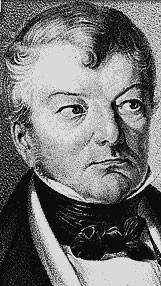A Quote by Heinrich Zschokke
The forces of things, the beings of the Universe, interpenetrate, divide and unite themselves according to eternal laws. But the laws of Nature are, to speak after the manner of men, Thoughts of God, in which all lives, that is to say, He is.
Related Quotes
In my understanding of God I start with certain firm beliefs. One is that the laws of nature are not broken. We do not, of course, know all these laws yet, but I believe that such laws exist. I do not, therefore, believe in the literal truth of some miracles which are featured in the Christian Scriptures, such as the Virgin Birth or water into wine. ... God works, I believe, within natural laws, and, according to natural laws, these things happen.
Just and true liberty, equal and impartial liberty, in matters spiritual and temporal is a thing that all men are clearly entitled to by the eternal and immutable laws of God and nature, as well as by the laws of nations and all well-grounded and municipal laws, which must have their foundation in the former.
Does man's freedom consist in revolting against all laws? We say no, in so far as laws are natural, economic, and social laws, not authoritatively imposed but inherent in things, in relations, in situations, the natural development of which is expressed by those laws. We say YES if they are political and juridical laws, imposed upon men by men.
For the religious, passivism [i.e., objects are obedient to the laws of nature] provides a clear role of God as the author of the laws of nature. If the laws of nature are God's commands for an essentially passive world ..., God also has the power to suspend the laws of nature, and so perform miracles.
The exercise of magical power is the exercise of natural powers, but superior to the ordinary functions of Nature. A miracle is not a violation of the laws of Nature, except for ignorant people. Magic is but a science, a profound knowledge of the Occult forces in Nature, and of the laws governing the visible or the invisible world. Spiritualism in the hands of an adept becomes Magic, for he is learned in the art of blending together the laws of the Universe, without breaking any of them and thereby violating Nature.
Laws, it is said, are for the protection of the people. It's unfortunate that there are no statistics on the number of lives that are clobbered yearly as a result of laws: outmoded laws; laws that found their way onto the books as a result of ignorance, hysteria or political haymaking; antilife laws; biased laws; laws that pretend that reality is fixed and nature is definable; laws that deny people the right to refuse protection. A survey such as that could keep a dozen dull sociologists out of mischief for months.
A scenario is suggested by which the universe and its laws could have arisen naturally from nothing. Current cosmology suggests that no laws of physics were violated in bringing the universe into existence. The laws of physics themselves are shown to correspond to what one would expect if the universe appeared from nothing. There is something rather than nothing because something is more stable.
...the laws of physics, carefully constructed after thousands of years of experimentation, are nothing but the laws of harmony one can write down for strings and membranes. The laws of chemistry are the melodies that one can play on these strings. the universe is a symphony of strings. And the "Mind of God," which Einstein wrote eloquently about, is cosmic music resonating throughout hyperspace.
The assumption that the laws of nature are eternal is a vestige of the Christian belief system that informed the early postulates of modern science in the seventeenth century. Perhaps the laws of nature have actually evolved along with nature itself, and perhaps they are still evolving. Or perhaps they are not laws at all, but more like habits.
The laws of Nature, that is to say the laws of God, plainly made every human being a law unto himself, we must steadfastly refuse to obey those laws, and we must as steadfastly stand by the conventions which ignore them, since the statutes furnish us peace, fairly good government, and stability, and therefore are better for us than the laws of God, which would soon plunge us into confusion and disorder and anarchy if we should adopt them.



































